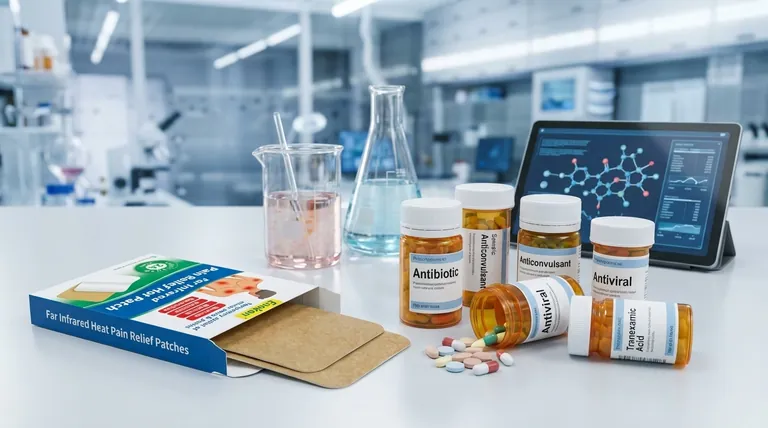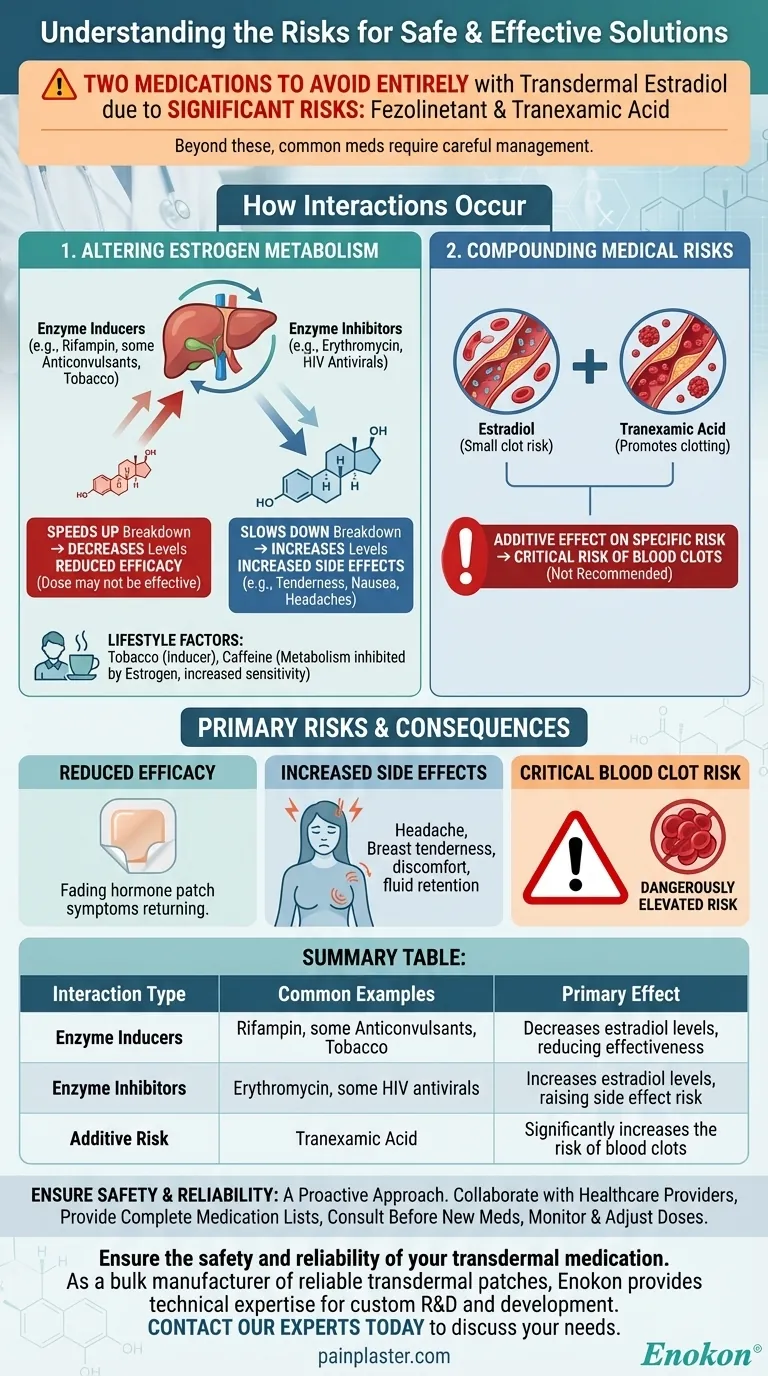Two medications to avoid entirely with transdermal estradiol are fezolinetant and tranexamic acid due to significant risks. Beyond these, a wide range of common medications—including certain antibiotics, anticonvulsants, and antivirals—can alter estradiol's effectiveness or increase side effects, requiring careful management by a healthcare provider.
The central issue is not just a list of drugs, but understanding how interactions occur. Most interactions either change the level of estrogen in your body, reducing its effectiveness or increasing side effects, or they compound its potential risks, such as blood clots.

How Drug Interactions with Estradiol Occur
To manage your health effectively, it’s crucial to understand the primary mechanisms behind these interactions. They generally fall into two categories: those that affect how your body processes estradiol and those that create a combined, additive risk.
Altering Estrogen Metabolism
Your liver uses enzymes, particularly the CYP450 family, to break down hormones and medications, including estradiol.
Some substances, known as enzyme inducers, speed this process up. This causes estradiol to be cleared from your body faster, potentially lowering its levels and reducing the effectiveness of your treatment.
Other substances, called enzyme inhibitors, slow the process down. This can cause estradiol levels to rise, increasing the risk of estrogen-related side effects.
Compounding Medical Risks
Some interactions don't involve metabolism at all. Instead, two drugs taken together can have an additive effect on a specific risk.
For example, since both estrogen and a drug like tranexamic acid can independently increase the risk of blood clots, using them concurrently creates a dangerously elevated risk.
Key Substances and Drug Classes to Be Aware Of
While a comprehensive list is impossible, several classes of drugs and lifestyle factors are well-known for their potential to interact with transdermal estradiol.
Anticonvulsants and Antibiotics
Many medications used to control seizures (anticonvulsants) and certain antibiotics (like rifampin) are potent enzyme inducers. They can significantly decrease the effectiveness of your estradiol patch.
Conversely, some other antibiotics (like erythromycin) can act as enzyme inhibitors, potentially increasing your estrogen levels and side effects.
Antivirals
Certain antiviral medications, particularly those used for treating HIV (protease inhibitors), can also inhibit the enzymes that break down estradiol. This can lead to higher-than-intended hormone levels.
Lifestyle Factors: Tobacco and Caffeine
Interactions are not limited to prescription drugs. Tobacco smoke is a known enzyme inducer that can speed up the breakdown of estrogen, potentially requiring a dose adjustment to maintain therapeutic effects.
Caffeine has a different relationship. Estrogen can inhibit the enzymes that clear caffeine from your system, making you more sensitive to its effects like jitteriness or insomnia.
Understanding the Primary Risks
The consequences of these interactions directly impact your treatment goals and safety. Being aware of them allows for proactive conversations with your healthcare team.
The Risk of Reduced Efficacy
The most common risk, especially with enzyme-inducing drugs and tobacco, is that your estradiol dose may no longer be effective. Symptoms you are trying to manage may return because the hormone is being cleared from your body too quickly.
The Risk of Increased Side Effects
When an enzyme inhibitor raises your estradiol levels, you may experience more estrogen-related side effects. These can include breast tenderness, nausea, headaches, and fluid retention.
The Critical Risk of Blood Clots
The interaction with tranexamic acid is particularly dangerous. This medication is used to control bleeding by promoting clotting. Because estrogen also carries a small but known risk of blood clots (thromboembolism), combining the two is not recommended as it creates an unacceptably high risk.
Ensuring Your Safety: A Proactive Approach
Managing potential drug interactions is a collaborative effort between you and your healthcare providers. Always prioritize open communication.
- If you are starting estradiol: Provide your doctor with a complete list of all medications, over-the-counter drugs, and supplements you take.
- If you are already on estradiol: Always consult your doctor or pharmacist before starting any new medication or supplement.
- If an interacting medication is necessary: Understand that the goal is often management through dose adjustments and monitoring, not necessarily stopping treatment (with the exception of high-risk combinations).
Proactive communication is the most effective tool for ensuring your transdermal estradiol therapy is both safe and effective.
Summary Table:
| Interaction Type | Common Examples | Primary Effect |
|---|---|---|
| Enzyme Inducers | Rifampin, some anticonvulsants, tobacco | Decreases estradiol levels, reducing effectiveness |
| Enzyme Inhibitors | Erythromycin, some HIV antivirals | Increases estradiol levels, raising side effect risk |
| Additive Risk | Tranexamic acid | Significantly increases the risk of blood clots |
Ensure the safety and reliability of your transdermal medication. As a bulk manufacturer of reliable transdermal patches for healthcare and pharmaceutical distributors, Enokon provides the technical expertise for custom R&D and development. Let us help you deliver high-quality, consistent hormone therapy products. Contact our experts today to discuss your needs.
Visual Guide

Related Products
- Far Infrared Heat Pain Relief Patches Transdermal Patches
- Far Infrared Deep Heat Relief Patches Medicated Pain Relief Patches
- Capsaicin Chili Medicated Pain Relief Patches
- Heating Pain Relief Patches for Menstrual Cramps
- Far Infrared Pain Patch Relief Pain Reliever for Back
People Also Ask
- How do Deep Heat Pain Relief Patches provide pain relief? Discover the Drug-Free Mechanism
- What are the key features of the Deep Heat Pain Relief Back Patch? Get Up to 16 Hours of Drug-Free Relief
- How quickly does the Deep Heat Pain Relief Back Patch activate and how long does it provide warmth? Get 16-Hour Relief
- Can heat patches be used for fresh injuries? Avoid This Common Mistake for Faster Recovery
- What did the UK Million Women Study find regarding transdermal versus oral hormone therapy? A Safer Choice for Gallbladder Health















